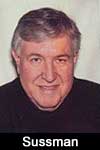Barry Sussman: Garry Wills, a Faith-Based America, and the Press
Posted at 11:10 pm, October 30th, 2006
Garry Wills, the cultural historian and longtime tracker of zealotry, lays out in the current New York Review of Books how America under George W. Bush, in a few short years, has become a country ruled by faith.
“Bush promised his evangelical followers faith-based social services, which he called ‘compassionate conservatism,’” Wills writes. “He went beyond that to give them a faith-based war, faith-based law enforcement, faith-based education, faith-based medicine, and faith-based science. He could deliver on his promises because he stocked the agencies handling all these problems, in large degree, with born-again Christians of his own variety. The evangelicals had complained for years that they were not able to affect policy because liberals left over from previous administrations were in all the health and education and social service bureaus, at the operational level. They had specific people they objected to, and they had specific people with whom to replace them, and Karl Rove helped them do just that.”
Few of the details in Wills’s report are new or shocking. One reason is that Bush didn’t hide most of what he was doing, he announced it and made political gains from it. Only some of the implementation was done very quietly. In addition, it’s not as though the news media didn’t take note. In footnotes to his 5,600-word piece, Wills cites nine news reports, starting in the year 2000, that depict steps along the way to a born-again government.
So an important question is, if Bush moved openly to merge church and state, and if reporters kept the public informed, and if a great many Americans oppose such a merger, how then was it accomplished so easily?
As I see it, there are two main reasons. First, pressure groups in society were generally passive. Pick your group: the Democrats in Congress, the centrist, more traditional religious leaders, educators, business and community leaders. Only scientists tended to persistently complain and point a finger.
And second, while there was some good reporting, there just wasn’t enough of it. In keeping the public informed, the press tuned in only every now and then. I can’t think of a single news organization that really got into this story regularly.
Many newspapers have a religion page every week, but since 2001 they’ve missed one of the biggest religion stories ever—the tearing down of the wall between church and state in America.
Too little press coverage means too little news. If a tree falls in the forest and no one is there to cover it, it’s not news. News isn’t what happened yesterday; it’s what reporters found out and told us about yesterday.




